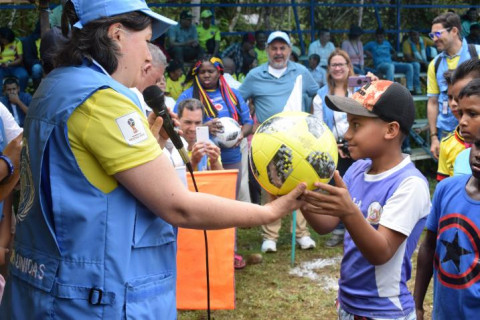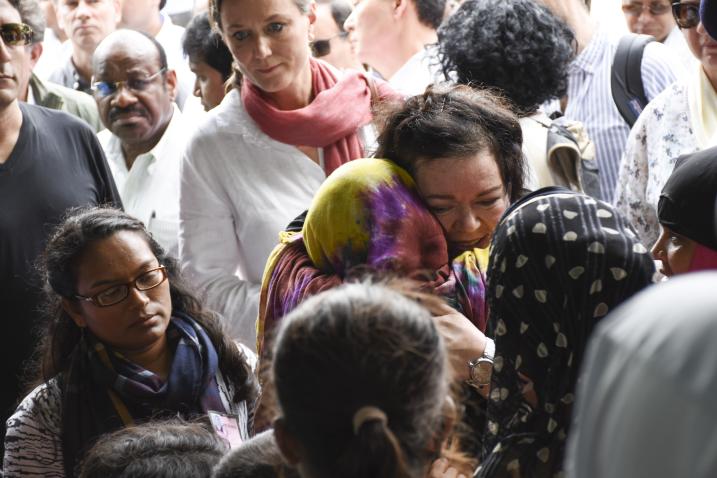
GCED Basic Search Form
Quick Search
Usted está aquí
Noticias

There is no mention of kindness—the act of giving without expecting anything in return—in the ambitious 2030 Agenda for Sustainable Development, which was adopted by 193 countries in 2015. While this may have been a surprising omission, the Agenda is still remarkable in that it unites all United Nations Member States in striving to achieve the 17 Sustainable Development Goals (SDGs), not just those countries traditionally classified as “developing” or “least-developed”. The Agenda represents the recognition that “we are all in the same boat” and that we need to work together to build a better world.
In many ways, with the introduction of the SDGs, we have started to recognize the strong interdependency among all beings living on this planet, and how one person’s or country’s actions can affect others living thousands of kilometres away. Climate change is one example of this interdependency. One country’s actions can trigger extreme events such as droughts and floods, thus hindering the entire world’s progress towards achieving the SDGs.
The degree and intensity of interdependency among various SDGs and among living beings in general pose a moral and behavioural dilemma. We all recognize that we live on a planet with finite resources. According to the Global Footprint Network, our current level of consumption requires 1.7 Earths, and will require two Earths by 2030. With this astonishing burn rate, the redistribution of resources among individuals within and between countries is crucial to achieving the SDGs.
This brings me to the importance of kindness, which, by its neurobiological nature, improves the happiness and well-being of the receiver and the giver.
The act of giving is key, but the act of refraining from decadence can also be seen as an act of kindness.
If we continue with the present mindset that we must produce more to narrow the inequality gap, we are doomed to failure. We must instead start to learn to share and come to terms with the notion that monetary wealth alone is not the key to happiness. There are enough studies demonstrating that there is indeed a ‘bliss point’, beyond which a marginal increase in happiness is reduced with each extra dollar of material wealth. This is not to be confused with socialism or communism but is rather what Immanuel Kant called the “moral imperative” of every individual. The act of giving is key, but the act of refraining from decadence can also be seen as an act of kindness.
It is important to recognize that monetary wealth is indeed important for a multidimensional understanding of well-being, as the economists Amartya Sen, Joseph Stiglitz, and many others have argued. Since well-being is multidimensional, and individuals have different degrees of preferences across the various dimensions of well-being, trade-offs are a grounded reality in our day-to-day decision-making.
Such decision-making is a bit more complex than what is proposed by the rational model of the present neoliberal economic system. On the contrary, people’s decision-making is highly irrational, as clearly demonstrated in Dan Ariely’s Predictably Irrational: The Hidden Forces That Shape Our Decisions (2008) and Daniel Kahneman’s Thinking, Fast and Slow (2011). But what I propose here is that although we perceive the emotional brain as irrational, recent neuroscientific research suggests that it plays a significant role in decision making. If this is the case, then this dimension, whether we call it irrational or emotional, could actually be seen as humanity’s saving grace. This will only be possible, however, if the emotional brain is trained.
The good news is that people are empathetic by nature. This natural trait, however, has been suppressed by the external environment to which we are subjected today. The fast pace of life, increasing employment insecurity, the stress of needing to excel at all times and, more recently, the increasing frequency of extreme events driven by climate change have all dampened our sensitivity to the plight of other beings. We need to bring back our natural tendency to practice kindness.
Training young people in Social and Emotional Learning (SEL) can help spark acts of kindness. In the last few years, SEL has emerged as a set of competencies (Durlak et al, 2011) through which individuals recognize and regulate emotions, identify positive purpose, demonstrate empathy for others, take constructive action and promote human flourishing. One such framework, called EMC2 (Singh and Duraiappah, 2019), seeks to provide explicit training in four competencies, namely, empathy (E), mindfulness (M), compassion (C) and critical inquiry (C), to encourage kindness and promote prosocial behaviour.
Empathy is the general capacity to recognize emotion and resonate with others’ emotional states, such as happiness, excitement, sorrow or fear. Empathy is naturally embedded in the human brain within the “mirror neuron network” (Baird et al, 2011) and forms the basis of societal structure.
Mindfulness is self-regulation and the building of conscious awareness that arises from paying attention to the experience of right now. (Jon Kabat-Zinn, 2013). It is designed to cultivate awareness of a) where attention resides; b) how emotions and feelings are experienced in the body; and c) how thought, beliefs, values, and emotions may influence one’s ability to pay attention and regulate emotion.

Compassion, like kindness, is the ability to take positive action to alleviate suffering in the other. It requires behavioural action motivated by the need and desire to improve the other’s well-being, and is the fundamental basis of promoting prosocial behaviour.
Critical Inquiry is the continued ability to question and evaluate decisions, actions and behavioural change through observation, experience, thinking, reasoning and judgment.
A call to action for global youth to increase and celebrate their acts of kindness is a powerful counterstroke to the daily dose of negative news and information we receive through our media platforms.
Each of the SEL competencies must be practiced and experienced to be learned; the beauty of this learning experience is that it builds kinder individuals. Research shows that the act of giving actually produces the feel-good neurotransmitter serotonin, thus increasing happiness (Luks, 1988). Continued acts of kindness set into motion an upward spiral of happiness, and reverse the downward spiral of depression and reduce levels of the negative neurotransmitter Gamma-Aminobutyric Acid (GABA) (Esch and Stefano. 2011).
A call to action for global youth to increase and celebrate their acts of kindness is a powerful counterstroke to the daily dose of negative news and information we receive through our media platforms. In many ways, acting out of kindness is a way to protest the present trend of pursuing happiness by increasing personal consumption and trying to capture as much as one can for oneself. Kindness—the word that is missing from the 2030 Agenda—might be the only means by which we can achieve our goals!
References
Baird, A. D., Scheffer, I. E., & Wilson, S. J. Mirror neuron system involvement in empathy: A critical look at the evidence. Social Neuroscience,6(4), 327-335, (2011). Available at: https://www.tandfonline.com/doi/abs/10.1080/17470919.2010.547085
Durlak, J. A., Weissberg, R. P., Dymnicki, A. B, Taylor, R. D., and Schellinger, K. B. (2011). The impact of enhancing students' social and emotional learning: a meta-analysis of school-based universal interventions. Child Dev. 82(1):405-32. Available at https://casel.org/wp-content/uploads/2016/06/meta-analysis-child-develop...
Esch, Tobias, and George B Stefano. “The neurobiological link between compassion and love.” Medical science monitor: international medical journal of experimental and clinical research vol. 17,3 (2011): RA65-75. doi:10.12659/msm.881441.
Kabat-Zinn, Jon, Full catastrophe living: using the wisdom of your body and mind to face stress, pain, and illness (New York, Bantam Books, 2013).
Luks, Allan, "Doing Good: Helper's High," Psychology Today 22, no. 10 (1988).
Singh, N., C., & Duraiappah, A.K., (2019) EMC2 – a whole brain framework for social and emotional learning. Position Paper UNESCO MGIEP.
URL:
https://www.un.org/en/un-chronicle/kindness-secret-achieving-sustainable-development-goals
